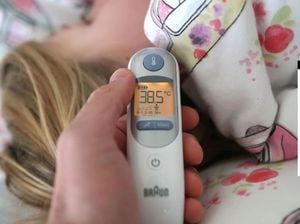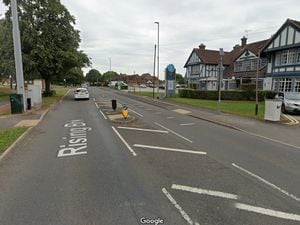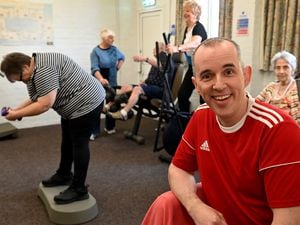Increase in West Midlands child hospital cases due to Strep A fears
Emergency departments across the Black Country have seen a 30 per cent increase in children being submitted over health concerns related to influenza and anxiety around Strep A.

Richard Beeken, the chief executive of Sandwell and West Birmingham NHS Trust, told senior NHS officials during an emergency winter planning meeting that a combination of anxiety around Strep A, and an uptick in children being submitted with either influenza or respiratory syncytial virus (RSV), were the cause.
On Friday, it was confirmed that two children with Strep A bacteria were being treated at Wolverhampton's New Cross Hospital.
Dr Mohit Mandiratta, a GP based in Halesowen, said primary care will “always prioritise children”.
“Parents are anxious with what they’re hearing and what they’re seeing," he said.
"So we will always prioritise children, but capacity is limited, but we will do our best to see who we can and there is always a point of contact.
“So despite what people are hearing about the pressure the health services are under they should not be discouraged to get in touch. If you are concerned about your child contact your GP if there’s no capacity you can’t get through to the GP, access 111, or go to A&E if instructed.”
It comes after GPs and pharmacists across the country say they are struggling to get hold of antibiotics for infections including Strep A, as the Government continues to insist there are no shortages.
On Thursday, the UK Health Security Agency (UKHSA) said the number of children under 15 who had died from invasive Strep A illness in England had risen to 13, taking the UK total to 15.
No shortages of antibiotics have been recorded in the region, Dr Mandiratta added, but said if there were shortages at a particular pharmacy “other pharmacies can direct patients there to pick up their prescriptions and alternatives we can prescribe”.
The meeting, called the ‘Black Country Winter Preparedness Plan’, outlined key services available to plug “pinch points” usually experienced by the NHS between Christmas and New Year.
Such measures include the introduction of ‘virtual wards’; community first approaches to nursing care; and being efficient with primary care; to reduce the hours in emergency departments unless absolutely necessary.
The Local Democracy Reporting Service (LDRS) queried Mr Beeken over the financial health of the Black Country Integrated Care System (ICS) – currently at a £42 million deficit.
Mr Beeken said the number “had to be put in context” of a £2 billion budget.
He said: “At the start of every financial year, you’ve got to make certain assumptions about the activity that you think you’re going to be asked to deliver, such as the number of staff you think you need to deploy in order to meet that activity, and the cost of that set against the income that you predict you’re going to receive as an organisation.
“The Government in its autumn statements has announced additional money for the NHS which is always welcome whether that additional money turns into sufficient to keep pace with demand caused by the either the deprivation of our health economy or the age profile of our health economy.
“I think it’s a point yet to be to be proven, but 42 million against an overall budget of over 2 billion is important context I would say.”
Mr Beeken assured the panel that services provided by individual emergency departments and primary care centres are at a higher level than pre-pandemic. He added the number of elective operations were “exceeding levels achieved in 2019”.
He said: “The NHS continues to have its pedal to the metal to try to deliver the care and the demands placed upon it.
“We want the public not to be frightened by negative stories about urgent and emergency care in the NHS. If people need medical help do not delay in seeking medical help. That’s a critical message that we all want to get across.
“Accessing the right care for the public’s individual needs can often be difficult, but if people keep in mind the fact that we’re continuing to provide the most resilient 111 service in the country, we have pharmacy services that are increasingly broad in their offer to the public.”
While the cost of living crisis has not seen a direct impact in local health provisions, Mr Beeken claimed life expectancy is “going backwards” in the Black Country.
He said: “We are all worried about the compound effect of the cost of living crisis on health and social care services in the Black Country.
“Life expectancy in the Black Country as a whole is going backwards, which is quite a sobering thought when you think we’re in the 21st century and the fifth richest nation on the planet. Having a warm roof over your head and a job that pays the bills are the two key determinants for mental wellbeing and physical health.
“So whilst I don’t – unless other colleagues may have hard facts at their fingertips regarding the impact of this on demand, we can only speculate that it will be having an impact, If not now, then very very shortly down the line.”
Vivek Khashu, strategy and engagement director at West Midlands Ambulance Service, told reporters ‘ambulance decision areas’ have been set up over the last six weeks to combat long delays in acute care.
They are designed to accommodate specially trained ambulance workers set up at Queen Elizabeth Hospital in Birmingham and Heartlands to look after patients who otherwise would be waiting on the back of ambulances.
Mr Khashu said the 12,000 hours were ‘lost’ to handover delays across the West Midlands in February had now been reduced to 4,800.
“We can bridge the divide and we can make sure our patients getting a better service,” he added.





